New 20mph speed limit will save lives - Mark Drakeford
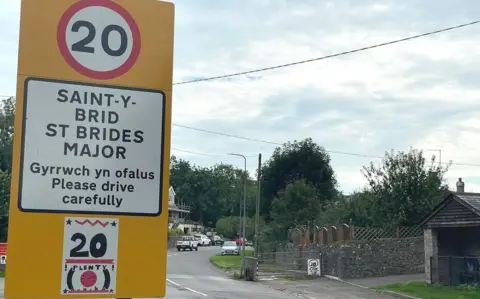 BBC
BBCWales' new 20mph speed limit will save lives, the first minister has insisted, 10 days before the lower limit for residential roads comes into force.
Mark Drakeford said the evidence was clear that "reducing speed limits reduces collisions and saves lives".
He was speaking before visiting an area that has been trying out the lower limit for more than two years.
Mr Drakeford will meet firms, parents and children in St Brides Major, Vale of Glamorgan, on Thursday.
But critics, including some in St Brides, want better enforcement of the traditional 30mph limit instead. There also been criticism from two Welsh Labour MPs.
On 17 September Wales will follow Spain, which made a similar change to 30kmh (18.6mph) in 2019 and has reported a fall in urban road deaths.
Most roads in Wales that are currently 30mph (50km/h) will become 20mph (32kmh), although councils have been able to impose exemptions and have done so.
Speaking on Radio Wales Breakfast earlier, Mark Drakeford said the 20mph will "will lead to fewer deaths" and "fewer accidents".
"It's a small price to pay in order to make sure that people are safe on the streets," he said.
He defended the £32.5m price-tag, saying its a "one-off cost" and will save the health service "£92m every single year".
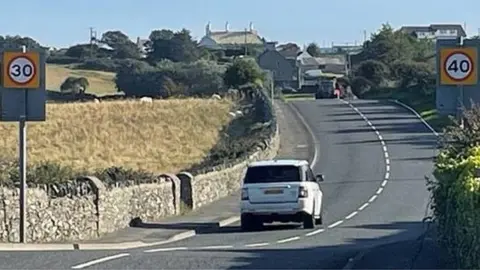 North Wales Police
North Wales PoliceThe first minister predicted that casualty numbers would fall by "thousands" over 10 years.
"This will undoubtedly reduce costs on emergency services," he said.
Plans to exempt a 30mph stretch of road at Cemaes have been approved during a debate at Anglesey council, the Local Democracy Reporting Service said, after it was deemed "unrealistic" to expect people to drive at 20mph on this road.
The council has also confirmed that several 20mph signs around Anglesey had been defaced.
"We have arranged for community gangs to go out and correct them," a spokesperson said.
"Additionally, we instructed community gangs to carry stock of spare stickers with them so that they can correct any ad hoc."
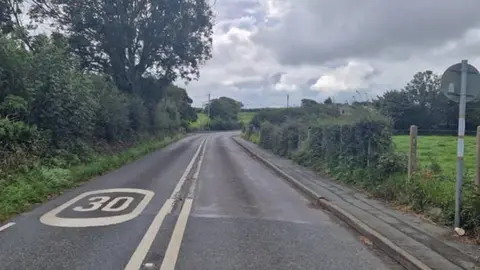 North Wales Police
North Wales PoliceThe Welsh Local Government Association said there were reports of signs being defaced in areas including Conwy, Gwynedd, Newport, Torfaen, Wrexham and Flintshire.
"Officers have been working hard to patrol, inspect, and replace stickers where possible," a spokesperson said.
"Due to this issue, some local authorities have now decided to no longer replace stickers, as we are only a matter of days away from the change."
Two Welsh Labour MPs, speaking anonymously to BBC Wales, criticised the 20mph policy.
One said they would prefer to see it introduced in a "gradual way" with ongoing evaluation, rather than "one fell swoop".
They would advise a Labour government to "be a bit more cautious", adding that the policy could be "handled better" and that they had concerns about "unforeseen consequences".
The other MP called the move a "blunt instrument", saying; "We don't live life in black and white.
"There are shades of grey and with the 20mph local authorities have the power to put in exemptions but how on earth can they facilitate that properly?
"Not enough consequences are thought about."
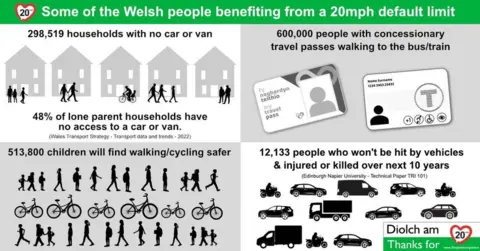 20's Plenty campaign
20's Plenty campaignBBC Wales political editor Gareth Lewis visited St Brides a few weeks before the first minister's visit to scope opinions on the changes.
The village has been part of a 20mph trial zone since July 2021, after a local campaign.
The main road through is a popular route for drivers going to the beaches at Ogmore and Southerndown, and further into the Vale.
Mingling with pub-goers in St Brides, I met Stephen Fisher, who described himself as an "ex-traffic cop".
"Speed is the biggest killer but you need to enforce the speeding rules," he told me.
He regards the 20mph plan as nothing more than a "political bullet point from Drakeford - and I just don't agree with it".
"I think it's a bit like the drink-drive laws were 30 to 50 years ago," he said.
"People then realised it was socially unacceptable, speeding will turn out to be exactly the same.
"But how are we going to do that? Enforcement.
"People don't like talking about getting themselves three points speeding through this village."
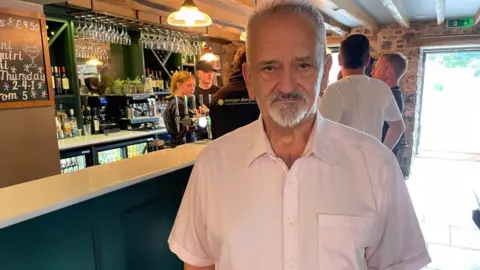
Would he welcome a speed camera here?
"Absolutely," he said, but accompanied by the old speed limit.
"30mph with a camera, absolutely."
A fellow drinker, also called Steve but preferred to not give me his surname, said he also wanted a speed camera, but called the 20mph trial a "great idea".
"It slows the traffic down," he said.
"And they need to be slowed down - people were coming through here at 50 miles an hour.
"You've got children playing, you've got people walking dogs.
"You still get the idiot coming through, but it's made a big difference."
An interim monitoring report of the trial zones carried out by Transport for Wales, and published in March showed an average reduction in speed of 3mph.
It also showed that when speed cameras were in place speed dropped further, only to return to previous levels once the enforcement period had ended.
Away from the trial, we headed to Barry, 16 miles from St Brides. It is Wales' biggest town and home to nearly 60,000 people.
By Welsh standards it is a big urban area, but when you look at the map of exemptions to the new 20mph law, there are vanishingly few.
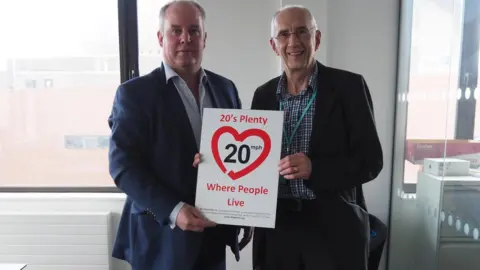 20's Plenty campaign
20's Plenty campaignWe spoke to businesses on the town's High Street and also one of the area's MSs - the leader of the Welsh Conservatives in the Senedd, Andrew RT Davies.
The Conservatives have been vocal opponents of the default 20mph plans, saying they should be used around places like schools and hospitals, but not everywhere.
They have also raised concerns about the price of the scheme and costs over the next 30 years because of longer journey times.
Mr Davies did pose with 20mph signs back in 2018 with campaigners from Sully, but says this was part of a more local campaign.
"We want to see safe roads, we want to see good road education, we want to see an uplift in standards on Welsh roads, but we don't believe having across Wales 20mph is the way to do that," he said.
"Yes, have it round schools, yes have 20mph around care homes and hospitals, people agree with that.
"We police by consent, people want to motor by consent, and I don't believe that people will want to subscribe to this particular measure.
"But if it's the law you have to stick to it."

Rachel Thomson, who works at Maggie Jo's coffee house in Barry, believes that's precisely what people won't do.
"I just don't think people are going to stick to it, to be honest.
"Some of the faster roads might drop to 20mph so I think it's going to cause a lot of confusion.
"On open roads is there any need to be going quite so slow?"
Catherine Goodman, at the Food for Thought Delicatessen, said 20mph is "perfect" for High Street, with so many shoppers and other pedestrians crossing the road.
Elsewhere, she said "it's going to be manic, there's going to be traffic everywhere".
"It's busy enough at school times - pick up times and drop off, it's just going to cause mayhem, I believe."
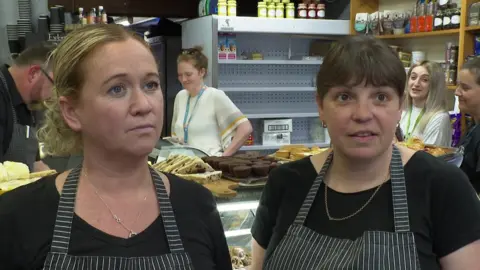
Her colleague Anna Hardwick agreed.
"Outside schools, yes I do agree. But, otherwise, I just don't see why we have to have all the roads at 20mph, no."
Both women say they would be unable to make as many deliveries due to the lower speed limit.
Plaid Cymru transport spokesperson Delyth Jewell said her party "fully supports the principle of safer speed limits".
"But it's also important that people feel listened to, especially where there has been no public consultation," she said.
"There are already exemptions to the 20mph changes, but communities should be supported in seeking further changes where 20mph doesn't seem quite right for where they live.
"Most people can agree on the need to make our roads safer and it's important this meets original aims - to be a sensible, reasonable safety measure that can be applied to the areas where cars and people interact the most."
